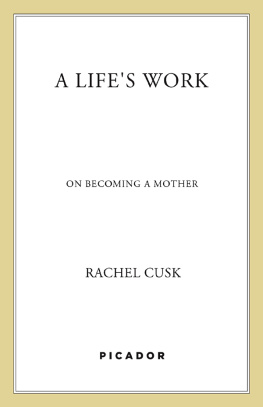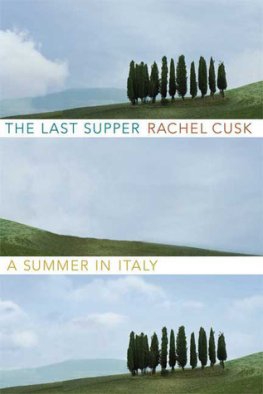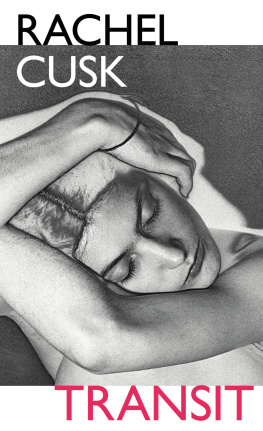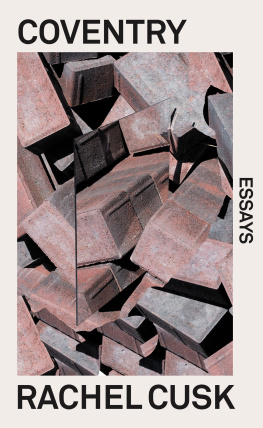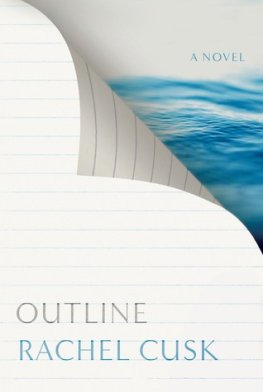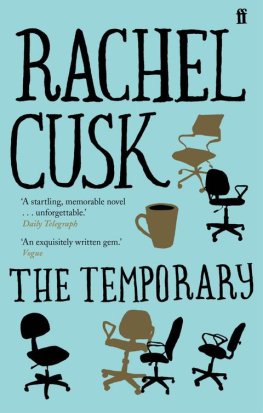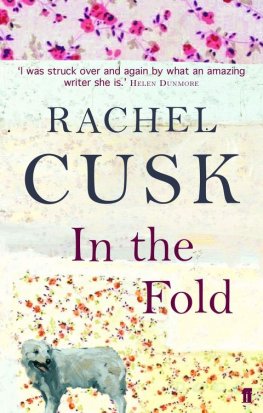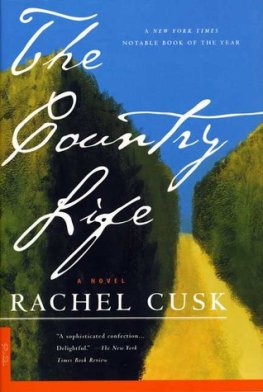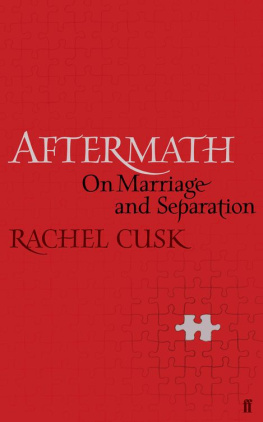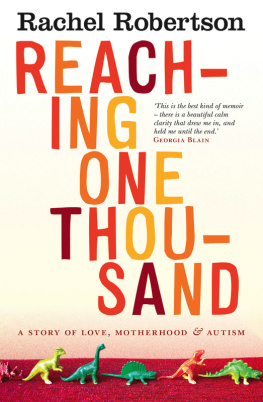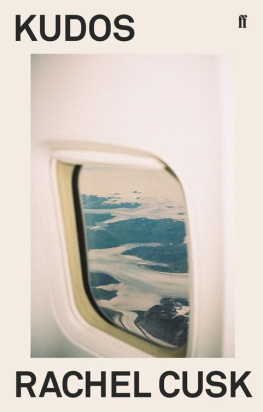Contents
Guide
Additional Praise for Rachel Cusks
A Lifes Work: On Becoming a Mother
I loved reading it, and found it fascinating, but I also found it dangerous. An incitement to riot its an extraordinary piece of work and the writing is utterly beautiful. I laughed out loud, often, in painful recognition.
Esther Freud, author of Hideous Kinky
She captures the absolute shock of suddenly finding yourself responsible for another personwith no training, no guidance, and, indeed, no one coming from their planet to take them back. A brilliant bookand so funny too.
Kate Atkinson, author of Behind the Scenes at the Museum
[Rachel Cusk] anatomizes motherhood as Montaigne anatomized friendship or Robert Burton anatomized melancholy. She observes her own sensations and transfers them, still bleeding, to the page where some alchemy of her prose renders this most fascinating and boring of all subjects graceful, eloquent, modest, and true.
Daily Telegraph
What is really startling about A Lifes Work is that it is genuinely post-feminist, not in the sense that we do not need feminism anymore, but in the sense that it implicitly points to the holes in the familiar feminist discourse. If we do away with the notion that the personal is political, as feminism-lite is wont to do, who gets left holding the baby? Cusk has crafted a work of beauty and wisdom.
New Statesman
It is as compulsive as a thriller.
The Observer (London)
The clarity of her writing matches its depth of content, as Cusk endeavors to discover what it means to be a parent. Ultimately, what Cusk offers is an expos of motherhood that extracts its myths and reworks them into personal truths.
Library journal
A penetrating, sometimes joyful and amusing, sometimes frightening and disturbing look at pregnancy and motherhood Parents will love this beautifully written, frank, and absorbing book.
Booklist
A powerful, often funny account of pregnancy, childbirth, and mothering that doesnt gloss over the pain, mystery, and confusionbut does celebrate the wonder Mothers and prospective mothers will find the experience as told here dauntingas well as intact, true, and whole.
Kirkus Reviews
A Lifes Work
On Becoming a Mother
RACHEL CUSK

The author and publisher have provided this e-book to you for your personal use only. You may not make this e-book publicly available in any way. Copyright infringement is against the law. If you believe the copy of this e-book you are reading infringes on the authors copyright, please notify the publisher at: http://us.macmillanusa.com/piracy.
For Adrian
I wish to thank Reagan Arthur and Georgia Garrett, for many deeply felt conversations and communications on the subject of motherhood. My stepdaughter, friend and ultimate ally Molly Clarke is an unspoken presence in these pages: I hope that one day she will read them and like them. She may not remember the dark February night on which she gave me her lucky necklace, but I do.
As child is equivalent with imagination, the mothers language becomes unimaginative, imperative, abstract. As the child is growth, she becomes static and empty, unable to react with spontaneous novelty. As the child is timeless, eternal, she becomes time-bound, scheduled, hurried. Her morality becomes one-sidedly responsible and disciplinarian. Her sense of future and hope is displaced on her actual child; thereby postpartum depression may become a chronic undertone. As her actual child carries her feelings of vulnerability, she may over-attend to it to the neglect of herself, with consequent resentments. Also, her thought processes become restricted to adult forms of reason so that the ghost voices and faces, animals, the scenes of eidectic imagination become estranged and feel like pathological delusions and hallucinations. And her language loses its emotion and incantational power; she explains and argues.
James Hillman, The Bad Mother
If at any point in my life I had been able to find out what the future held, I would always have wanted to know whether or not I would have children. More than love, more than work, more than length of life or quantity of happiness, this was the question whose mystery I found most compelling. I could imagine those other things; giving birth to a child I could not. I wanted to know whether I would go through it, not because this knowledge would have made motherhood imaginable, but because it seemed to me that the issue could not remain shrouded in uncertainty without becoming a distraction. It was this distraction, as much as the fact of motherhood itself, that I wanted to have within my control. I regarded it as a threat, a form of disability that marked me out as unequal. But women must and do live with the prospect of childbirth: some dread it, some long for it, and some manage it so successfully as to give other people the impression that they never even think about it. My own strategy was to deny it, and so I arrived at the fact of motherhood shocked and unprepared, ignorant of what the consequences of this arrival would be, and with the unfounded but distinct impression that my journey there had been at once so random and so determined by forces greater than myself that I could hardly be said to have had any choice in the matter at all.
This book is an attempt to describe something of that arrival, and of the drama of which childbirth is merely the opening scene. It is, necessarily, a personal record of a period of transition. My desire to express myself on the subject of motherhood was from the beginning strong, but it dwelt underground, beneath the reconfigured surface of my life. A few months after the birth of my daughter Albertine, it vanished entirely. I wilfully forgot everything that I had felt so keenly, so little time ago: I couldnt bear, in fact, to feel it. My appetite for the world was insatiable, omnivorous, an expression of longing for some lost, pre-maternal self, and for the freedom that self had perhaps enjoyed, perhaps squandered. Motherhood, for me, was a sort of compound fenced off from the rest of the world. I was forever plotting my escape from it, and when I found myself pregnant again when Albertine was six months old I greeted my old cell with the cheerless acceptance of a convict intercepted at large. What I had begun cautiously to think of as freedom became an exiguous hammock slung between the trunks of two pregnancies: I was surrounded, and it was then that the strange reality of motherhood grew apparent to me once more. I wrote this book during the pregnancy and early months of my second daughter, Jessye, before it could get away again.
I make this explanation with the gloomy suspicion that a book about motherhood is of no real interest to anyone except other mothers; and even then only mothers who, like me, find the experience so momentous that reading about it has a strangely narcotic effect. I say other mothers and only mothers as if in apology: the experience of motherhood loses nearly everything in its translation to the outside world. In motherhood a woman exchanges her public significance for a range of private meanings, and like sounds outside a certain range they can be very difficult for other people to identify. If one listened with a different part of oneself, one would perhaps hear them. All human life on the planet is born of woman, wrote the American poet and feminist Adrienne Rich. The one unifying, incontrovertible experience shared by all women and men is that months-long period we spent unfolding inside a womans body Most of us first know both love and disappointment, power and tenderness, in the person of a woman. We carry the imprint of this experience for life, even into our dying.

